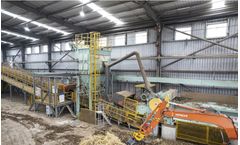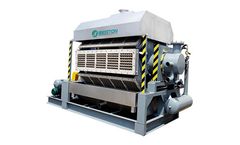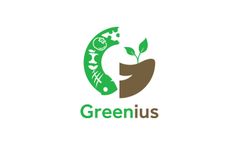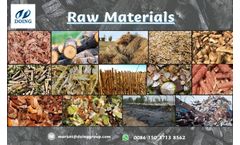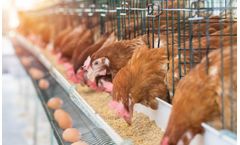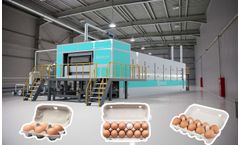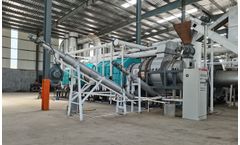Agricultural And Forestry Wastes Articles & Analysis
96 articles found
Dealing with waste resulting from farm activities is a problem no farmer can avoid. With charges introduced for waste exemptions, it’s important to minimise waste to reduce the cost of compliant disposal, says ADAS Agricultural Consultant Cheryl Williams. Waste on farms typically arises from the normal use of inputs, but it also refers to packaging, containers, crop film, bale wrap ...
The palm oil industry is a cornerstone of agricultural economies in many tropical regions, especially in Southeast Asia and Africa. As the demand for palm oil grows globally, so does the volume of agricultural waste produced—particularly palm kernel shells (PKS). Once considered a low-value byproduct, these shells are now gaining attention for their untapped potential. Through advanced pyrolysis ...
The scalability of manufacturing processes is a key factor for businesses aiming to expand production volumes while maintaining efficiency and quality. A coffee cup tray making machine is an essential tool for manufacturers seeking to optimize their production lines and increase output. This machine not only improves the efficiency of the manufacturing process but also enhances flexibility, ...
The "Five Utilization” of Agricultural and Forestry Wastes The "five" utilization of agricultural and forestry wastes is fertilizer, feed, fuel/energy, base material, and raw material. ...
The egg tray machine has proven itself indispensable in modern packaging and manufacturing, particularly within the poultry industry. As industries evolve and sustainability becomes a primary focus, the future of egg tray machines looks promising, marked by technological innovations and an expanding range of applications. Egg tray machine suppliers are increasingly adopting cutting-edge ...
In today’s rapidly urbanizing world, sustainable living practices have become more important than ever. As cities expand, so does the need for smarter waste management solutions. One such innovative solution is the use of waste to compost machine—machines that turn everyday organic waste into nutrient-rich compost for urban farming. Greenius, a leader in eco-friendly technology, is ...
Biochar’s properties make it an ideal soil amendment, helping farmers improve soil health while also promoting sustainability in agriculture. What is Biochar? Biochar is a carbon-rich material produced through the process of pyrolysis, where organic biomass, such as agricultural residues or forestry waste, is heated in an ...
Agricultural waste, which includes materials such as crop residues, wood chips, and nutshells, can be a valuable resource when converted into high-quality charcoal. This process not only helps in managing waste but also produces a product that has numerous applications, including fuel for cooking, soil amendment, and industrial uses. Here’s a detailed guide on how to process agricultural ...
Biochar is a carbon-rich material produced through the pyrolysis of organic biomass under low oxygen conditions. Common feedstocks include agricultural waste, forestry residues, and even municipal organic waste. ...
Biochar, a carbon-rich byproduct derived from the thermal decomposition of organic materials, is gaining attention for its environmental and agronomic benefits. Derived from agricultural waste biomass, biochar not only provides a sustainable way to manage waste but also serves as an effective soil amendment, enhancing soil fertility and sequestering carbon. Understanding how biochar is made and ...
Developing a Cost-Efficient Strategy for Continuous Quality Monitoring of Feed Ingredients Rich-protein grain, cereals, oilseeds and various by-products are the common feed ingredients for poultry and swine. In recent years, farmers worldwide are struggling with the increasing prices of raw materials which resulted in the need to maintain optimal livestock performance in a cost-effective manner. ...
Egg cartons. Those humble cardboard companions that cradle our breakfast essentials. But have you ever stopped to think about their environmental impact? Traditional egg cartons, often made from polystyrene foam, can take centuries to decompose, adding to landfill woes. Thankfully, there's a brighter side to the egg carton story: sustainable paper egg cartons! These eco-friendly options offer a ...
Let's delve into the myriad benefits of producing charcoal from agricultural waste biomass. 1. Waste Valorization Agricultural waste biomass, such as crop residues, straw, husks, and stalks, is abundantly available in agricultural regions worldwide. ...
Its beneficial effects on soil fertility, nutrient availability, and water holding capacity contribute to enhanced plant growth and productivity. Sustainable Agriculture: Biochar promotes sustainable agriculture practices by reducing the need for synthetic fertilizers and pesticides. ...
Heritage Farms, led by manager Allan Smirl for over a decade, has continuously sought innovative ways to improve their operations. In 2014, the farm began a partnership with Decisive Farming to enhance decision-making processes impacting the farm’s ...
The cost of upgrading farms using modern technology can be significant. Fortunately, there are a number of Canadian government grants for farmers, ranchers, and producers to alleviate these financial burdens. Technology plays a major role today in enhancing a farm’s production efficiency, yields and profits over the ...
Introduction Evolution of Agricultural Waste Management The landscape of agricultural waste management has undergone a paradigm shift, driven by the need for sustainable practices. Amid this transformation, biochar production equipment emerges as a cornerstone, revolutionizing the processing of agricultural waste. Role of Biochar Production Equipment Biochar production equipment represents a ...
Introduction In the intricate dance between agriculture and sustainable energy, a profound synergy emerges. This section unveils the symbiotic relationship between agricultural planting and the quest for innovative charcoal production solutions, ushering in an era where farming residues become the backbone of renewable energy. The Bounty of Agricultural Residues Jute Sticks: Fibrous Riches from ...
IntroductionCharcoal, a ubiquitous element in households and industries alike, has long been associated with deforestation and environmental degradation. However, a paradigm shift is underway as we explore the transformative potential of utilizing agricultural waste for charcoal production. This article delves into the impact of this innovative approach on sustainable agricultural development, ...
Wood charcoal making machines, with their remarkable ability to transform wood into charcoal, hold a crucial place in the realm of agricultural production. Beyond the conventional understanding of charcoal's role in grilling and heating, these machines play a pivotal role in enhancing agricultural practices and sustainability. In this article, we explore the multifaceted role of wood charcoal ...



